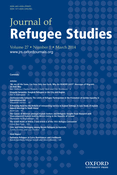-
Views
-
Cite
Cite
Elisabeth Olivius, (Un)Governable Subjects: The Limits of Refugee Participation in the Promotion of Gender Equality in Humanitarian Aid, Journal of Refugee Studies, Volume 27, Issue 1, March 2014, Pages 42–61, https://doi.org/10.1093/jrs/fet001
Close - Share Icon Share
Abstract
In humanitarian aid to refugees, participatory and community-based approaches are today strongly emphasized as the path towards more efficient protection and assistance. Participation and community mobilization are particularly constructed as a vehicle for the promotion of gender equality. This paper explores how participatory and community-based approaches are used in efforts to promote gender equality in humanitarian aid to Burmese refugees in Thailand and Bangladesh. Refugees in Bangladesh, especially women, are problematized as passive and dependent due to their alleged lack of ‘community spirit’ and participation. In contrast, the political activism of refugee leaders and women’s organizations in Thailand is represented as problematic, illegitimate and unruly. While refugees in Bangladesh do not participate enough, it appears that the refugees in Thailand participate too much. Drawing on interviews with humanitarian workers, this paper examines this paradox through a governmentality perspective, draws out the meanings attached to the concept of participation in humanitarian policy and practice and shows how participation is employed in the government of refugees.


